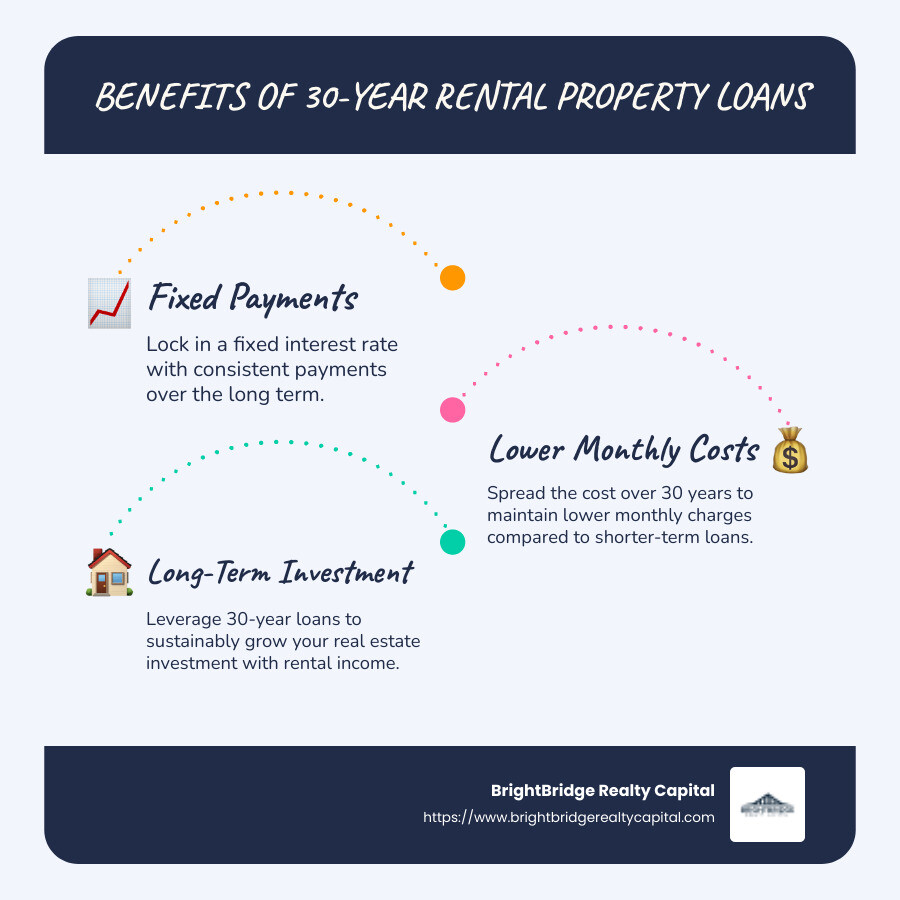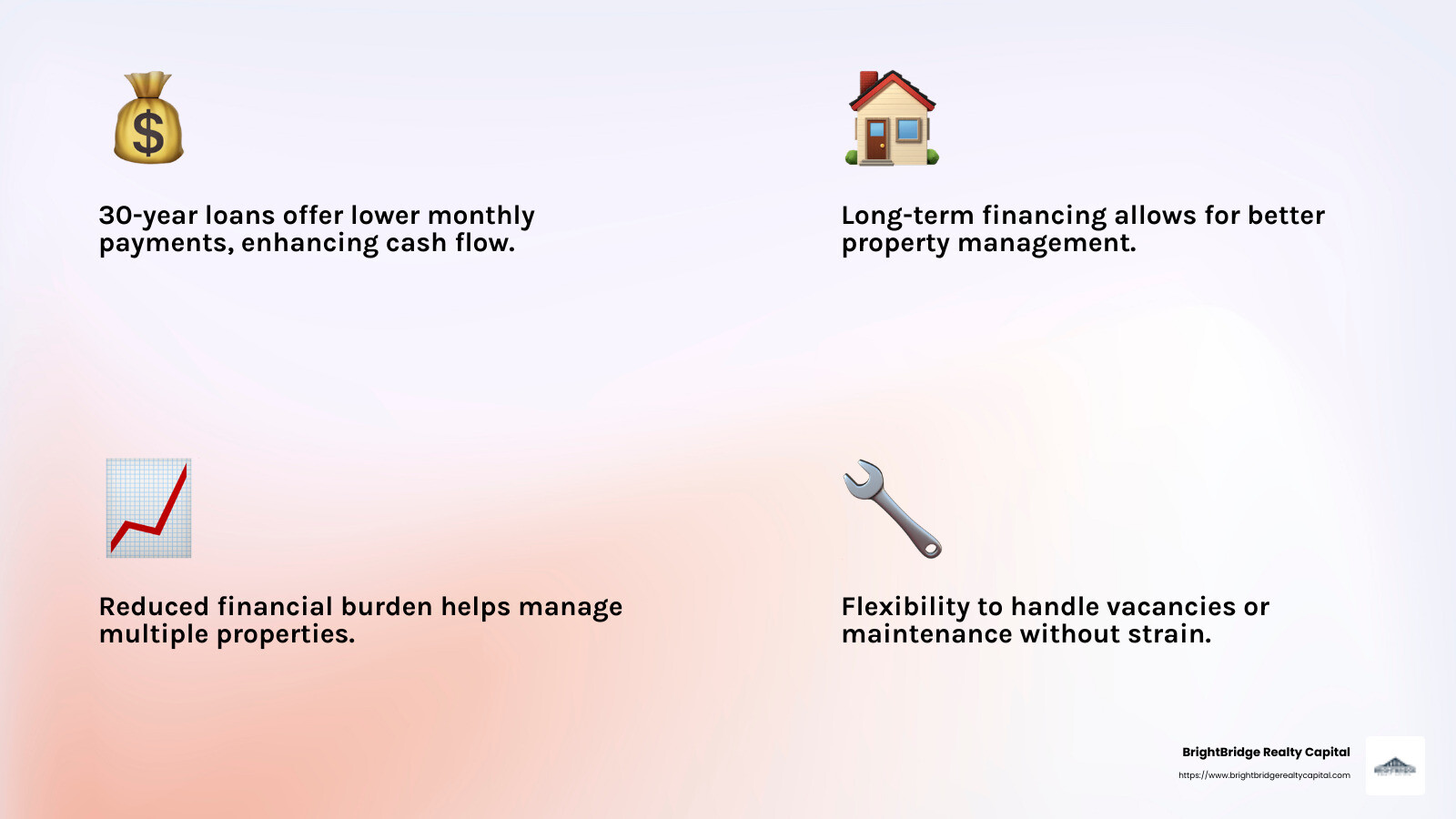The Long Haul: Understanding 30-Year Loans for Rental Properties

Rental property loans 30 year plans can be a game-changer for any real estate investor looking to secure stable financing with manageable monthly payments. Here's what you need to know:
- Stable Payments: You lock in a fixed interest rate with consistent payments over the long haul.
- Spread Out Cost: The 30-year term spreads the cost, helping keep monthly charges lower compared to shorter-term loans.
- Flexible Financing: Ideal for building or expanding your rental portfolio with predictable expenses.
Thinking about building long-term wealth through rental properties? A 30-year loan option invites you to leverage financing power along with rental income to grow your investments sustainably.
In this guide, we’ll explore how 30-year loans fit into your rental property investment strategies. You'll find the benefits they offer, the types available, and key considerations to keep in mind. Whether you’re new to rental investments or expanding an existing portfolio, understanding these loans can serve as a crucial step in your real estate journey.

What are 30-Year Rental Property Loans?
30-Year Rental Property Loans are a popular choice among real estate investors. They offer a fixed-rate mortgage setup for investment properties. This means that the interest rate remains the same throughout the life of the loan, providing predictability and stability.
Why Choose a 30-Year Term?
The 30-year term is significant because it allows investors to spread out their loan payments over a longer period. This results in lower monthly payments compared to shorter-term loans. Lower payments can improve cash flow, making it easier to manage expenses and reinvest in other opportunities.
Fixed-Rate Mortgage: What Does It Mean?
A fixed-rate mortgage ensures that the interest rate you start with is the one you keep for the entire loan term. This is particularly beneficial for rental property investments, as it shields you from fluctuations in the market. You know exactly what your payments will be each month, which aids in budgeting and financial planning.
Investment Property: The Basics
When you're dealing with an investment property, you're purchasing real estate with the intention of earning a return, either through rental income, future resale, or both. Investment properties are considered riskier by lenders, which is why the rates are typically higher than those for primary residences.

Loan Terms: What to Expect
Loan terms for 30-year rental property loans usually include:
- Interest Rates: Typically higher than those for primary residences. Rates are influenced by factors like credit score, down payment, and current market conditions.
- Down Payment: Often requires a larger down payment. This can range from 20% to 35%, depending on the lender and your financial profile.
- Credit Score: A higher credit score can help secure better rates. Lenders generally look for scores above 740 for the best deals.
- Cash Reserves: Lenders may require you to have a certain amount of cash reserves to cover potential vacancies or unexpected expenses.
Understanding these aspects is crucial for anyone considering a 30-year rental property loan. It can help you make informed decisions and set realistic expectations for your investment journey.
Benefits of 30-Year Loans for Rental Properties
Improved Cash Flow
One of the biggest perks of 30-year rental property loans is the potential to improve cash flow. By spreading the loan payments over 30 years, investors benefit from lower monthly payments. This leaves more money in your pocket each month, which you can use to cover property expenses, save for future investments, or simply boost your financial cushion.

Lower Monthly Payments
Lower monthly payments are a game-changer for real estate investors. With a 30-year term, your financial burden is reduced compared to shorter-term loans. This affordability can make it easier to manage multiple properties or weather unexpected costs without straining your budget.
Consider this: with lower payments, you have more flexibility to deal with vacancies or maintenance issues. It also allows you to maintain competitive rental rates, attracting and retaining tenants more effectively.
Long-Term Investment Stability
Investing in rental properties is often about playing the long game. A 30-year loan provides stability, ensuring that your interest rate remains unchanged throughout the loan's life. This predictability is invaluable for long-term financial planning.
With a fixed-rate mortgage, you can confidently forecast your expenses and profits. This stability not only helps in managing your current investments but also in planning for future acquisitions. Over time, as rental income increases and property values appreciate, the fixed costs of your mortgage become even more advantageous.
In summary, the 30-year rental property loan is a strategic tool for real estate investors aiming for steady cash flow, manageable monthly payments, and a stable, long-term investment. By choosing this path, you're setting a solid foundation for building wealth through real estate.
Key Considerations for 30-Year Rental Property Loans
When diving into 30-year rental property loans, it's crucial to understand the key factors that can influence your investment. Let's break down the essentials:
Interest Rates
Interest rates for rental property loans are generally higher than those for primary residences. This is because investment properties are seen as riskier by lenders. Typically, the rates are about 125 to 300 basis points higher. For example, if the current rate for a 30-year fixed-rate residential loan is 6.75%, expect rates for rental properties to range from 8% to 9.75% (source).
Down Payment
Down payments on rental properties are typically higher than those required for primary residences. Lenders often require at least 20% to 25% down. This higher requirement helps mitigate the lender's risk. However, putting down more than the minimum can lower your interest rate and monthly payments, providing long-term savings.
Credit Score
Your credit score plays a significant role in securing a 30-year rental property loan. While some alternative lenders might accept scores as low as 620, a score of 700 or higher is generally preferred. A higher credit score not only increases your chances of approval but also helps you secure better interest rates.
Cash Reserves
Lenders like to see that you have cash reserves—funds set aside to cover several months of mortgage payments. This acts as a safety net, ensuring you can meet your obligations even if the property isn't generating income due to vacancies or unexpected expenses. Typically, lenders might require reserves equivalent to six months of mortgage payments.
Understanding these factors can help you steer the landscape of 30-year rental property loans more effectively. Being prepared with the right down payment, maintaining a healthy credit score, and ensuring you have adequate cash reserves can make the process smoother and set you up for success in your real estate investment journey.
Types of 30-Year Loans for Rental Properties
When it comes to financing your rental property with a 30-year loan, you have several options to consider. Each type of loan comes with its own set of features and benefits, so understanding these can help you make the best decision for your investment.
Conventional Loans
Conventional loans are a popular choice for many real estate investors. Offered by banks and credit unions, these loans are not backed by the government. They usually come with fixed interest rates, which can make budgeting more predictable over the long term. However, they also typically require a higher down payment, often between 20% to 25%, and a strong credit score. Conventional loans are ideal if you meet these criteria and prefer a straightforward loan process.
DSCR Loans
Debt-Service Coverage Ratio (DSCR) loans are tailored for rental properties based on the income they generate. Unlike conventional loans, DSCR loans focus less on your personal income and more on the property's income. This makes them a great option if you're looking to leverage the rental income to qualify for a loan. DSCR loans are often considered "low-doc" loans because they require less personal financial documentation. This can be advantageous for investors who have multiple properties or inconsistent personal income.
Alternative Lenders
If you're unable to qualify for a conventional or DSCR loan, alternative lenders might be the solution. These lenders offer more flexible criteria, sometimes accepting lower credit scores or smaller down payments. They can also provide faster approval processes, which is beneficial if you're looking to quickly close on a property. However, these loans might come with higher interest rates and fees, so weigh the costs against the benefits.
Choosing the right type of 30-year rental property loan depends on your financial situation and investment goals. Whether you opt for the stability of a conventional loan, the income-based approach of a DSCR loan, or the flexibility of alternative lenders, understanding your options will help you make an informed decision that aligns with your real estate investment strategy.
Frequently Asked Questions about 30-Year Rental Property Loans
What is the typical interest rate for a 30-year rental property loan?
Interest rates for 30-year rental property loans are generally higher than those for residential mortgages. This is because investment properties pose a greater risk to lenders. Typically, these rates can be 125 to 300 basis points higher than conventional residential loans. For example, if the current mortgage rate for a 30-year fixed-rate residential loan is 6.75%, you might expect rates for rental property loans to fall between 8% and 9.75%.
How does a DSCR loan differ from a conventional loan?
DSCR loans and conventional loans serve different needs for real estate investors. A DSCR loan is primarily based on the cash flow generated by the rental property. This means the main focus is on whether the property's income can cover its debt obligations. DSCR loans are often considered "low-doc" because they don't require extensive personal financial documentation, making them ideal for investors with multiple properties or irregular personal income.
In contrast, conventional loans are more standardized and focus heavily on the borrower's personal financial situation, including credit score and income. They often require a higher down payment and a strong credit score, typically 680 or above. Conventional loans might offer lower interest rates but come with stricter qualification requirements.
What are the down payment requirements for a 30-year rental property loan?
Down payment requirements vary based on the type of loan and lender. For conventional loans, you can expect to put down between 20% to 25% of the property's purchase price. This higher percentage is due to the increased risk associated with investment properties.
On the other hand, DSCR loans may offer more flexibility. These loans usually have a maximum Loan-to-Value (LTV) ratio of 80% for purchases and rate-and-term refinances, meaning you may need to provide a 20% down payment. However, the exact requirement can vary based on your creditworthiness and the property's location.
Understanding these requirements will help you prepare financially and choose the loan that best aligns with your investment strategy.
Conclusion
Navigating 30-year rental property loans can be complex, but it doesn't have to be daunting. At BrightBridge Realty Capital, we pride ourselves on offering flexible funding solutions custom to your unique investment needs. Whether you're a seasoned investor or just starting, our team is committed to providing real estate financing that helps you achieve your financial goals.
Our quick, seamless process ensures that you can take advantage of opportunities as they arise. With fast closings, often within a week, you won't miss out on potential investments due to slow funding. Plus, by cutting out intermediaries, we offer competitive rates that are hard to beat.
In the changing real estate market, having a reliable financial partner can make all the difference. BrightBridge Realty Capital stands ready to support your journey with expert advice and customized loan options. Whether you're looking to grow your rental portfolio or secure a long-term investment, we're here to help you every step of the way.
Ready to explore your options? Contact us today to learn more about how our real estate financing solutions can work for you.


